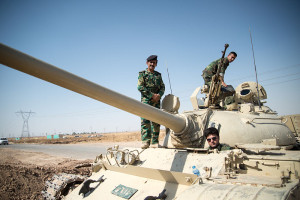Foreigners are joining Kurdish forces in the fight against ISIS
It is estimated that more than several dozen fighters, mostly from Europe and Northern America have joined the fight against the Islamic State (ISIS) in northern Iraq in efforts to counter the advances of radical Islamists in the Middle East. This trend has been less publicized than similar and more numerous occurrences of foreigners helping ISIS form an Islamic caliphate. ISIS seeks to merge the current territories of Iraq and Syria into a single state, within which it hopes to unify all Muslims under its leadership and implement sharia law. Many international volunteers, most of them with previous military experience, are travelling to the Kurdish controlled region in Iraq to fight against ISIS. The conflict in Syria and Iraq has attracted a lot of media attention, particularly in relation to the global appeal of joining ISIS for young foreigners. The events developing in the region have taken an increasingly globalized turn, drawing more participants into the fight and prompting the creation of an international coalition to counter the progress of Islamic extremist.
Foreigners who have joined the fight against ISIS, independent of the official U.S.-led coalition, come from different parts of the world. A majority travel from countries such as Canada, Britain and the Netherlands. Moreover, several U.S. citizens with military backgrounds, sometimes veterans from recent conflicts in Iraq and Afghanistan, are returning to the Middle East to support the Kurdish military.
Individuals joining the fight against ISIS are not being prosecuted by their home nations and sometimes receive support from their governments for their involvement. Such is the case for American citizens as well as for those traveling from the Netherlands, where the phenomenon has lead to declarations by state prosecutors permitting an involvement in foreign conflicts. Many western nations are attempting to prevent their citizens from joining forces with ISIS. Thus, most nations have declared that joining the group is illegal.
Foreigners aiding Kurdish forces present justifications ranging from the idea that fighting against an extremist group fulfills a personal sense of duty to making commercial gains through security contracts. Regardless of the reasons, some of these fighters are well prepared. Many of those returning to Iraq have had significant experience fighting there in the past and their skills are highly useful to Kurdish forces struggling against the destructive advances of ISIS.
The number of foreign fighters working against ISIS is rather small and it is estimated that only a few dozen have currently taken up arms against the group. However, it is difficult to define the exact numbers due to the developmental nature of the phenomenon, thus the results could be higher.
Currently, videos of hostages, executions of religious minorities, recruitment strategies and other graphic images are being shared through ISIS’ official media source, Al Hayat Media Center. ISIS utilizes these videos to communicate with international audiences. The group even boasts a foreign contingent of close to 16,000 fighters from outside of the Syria and Iraq. International media and foreign audiences focus a lot on ISIS communication operations. Consequently, few sources discuss foreign fighters helping Kurdish forces fight against ISIS
Although some of the videos attempt to recruit foreigners to join ISIS, there are many who remain skeptical. So much that foreigners are joining the Kurds because of the atrocities committed by ISIS. Several British and German veterans have decided to join the Kurdish cause against ISIS because they do not agree with the use of violence and oppression against innocent people. Many of these fighters give humanitarian reasons to explain their reason for joining the fight against terrorism.
The United States recently renewed its stance to refuse to put troops on the ground in the region. Thus, the influx of independent fighters is an unexpected occurrence. It provides crucial assistance to the struggling Kurdish forces and has created renewed hope in their ability to challenge the advance of ISIS. Though their numbers pale in comparison with the recruitment figures of the extremists, there appears to be an increasing realization of the necessity for international intervention. What lasting impact this will have on the conflict and whether the trend will continue is currently uncertain, but it remains a much-needed resource for the Kurds and those suffering from the oppression of ISIS.

